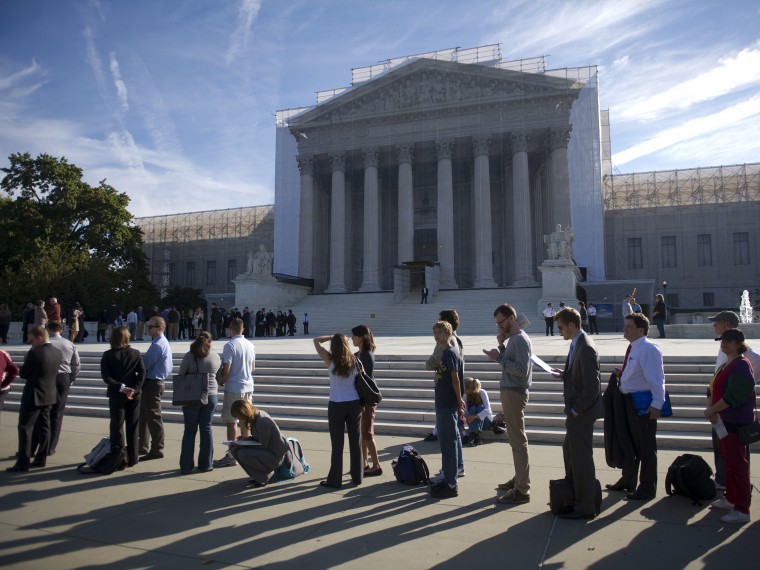Update, 12:00pm:
NBC News Justice correspondent Pete Williams emerged from the courtroom doubtful that the Voting Rights Act will remain fully intact. "I think it's a safe prediction to say that the Voting Rights Act as it now stands is not going to survive. The question is how far will the Supreme Court go?"
Both Chief Justice Roberts and Justice Kennedy, the likely swing votes, reportedly had concerns with the law. Williams reports that Kennedy said at one point during the hearings "The Marshall Plan was a good thing at one time but times change."
The justices were apparently concerned with the fact that the law is too "backward looking" focused on the states with a history of racial discrimination. "Many of the justices said that the problems in the south aren't as bad as they are in places in the north and it troubled them that the law doesn't have any way to deal with that," he said.
One possible outcome is that the court could decide to strike down only the coverage map. That would leave it to Congress to come up with the list of states that require coverage based on more recent voter suppression tactics. But if that happened, Republicans in Congress would likely oppose any action on the issue, so in essence this would have the effect of striking down Section 5.
Rev. Al Sharpton seemed concerned about the law's future after the hearing as well. "The arguments that we heard this morning gives us cause to pause and hope that we will not have to return to the streets to secure voting rights," he said
Sharpton pointed out that it "could not be more ironic or providential" that the hearing to decide the fate of the Voting Rights Act came on the same day as the unveiling of the Rosa Parks memorial, given her role in the civil rights movement that fought for these rights.
Update, 11:06am: The respected SCOTUSBlog tweets: "VRA Sec 5 almost sure to be invalidated 5-4. Congress will have to reconsider the preclearance formula."
On the blog itself, Tom Goldstein offers a bit more analysis based on the early arguments:
Following through on the deep constitutional concerns stated in its prior Northwest Austin decision, a majority of the Court seems committed to invalidating Section 5 of the Voting Rights Act and requiring Congress to revisit the formula for requiring preclearance of voting changes. The vote seems quite likely to be five-to-four. The more liberal members pressed both the narrow argument that an Alabama county was not a proper plaintiff because it inevitably would be covered and the broader argument that there was a sufficient record to justify the current formula. But the more conservative majority was plainly not persuaded by either point. It is unlikely that the Court will write an opinion forbidding a preclearance regime.
Oral arguments have begun in Shelby County v. Holder, in which the Supreme Court will decide whether a key provision of the 1965 Voting Rights Act is constitutional. The house is packed, and we'll have updates here throughout the day as news comes in from the court.
At issue is Section 5, which allows the federal government to block even minor election changes made by certain jurisdictions covered under the law, if those changes are deemed to reduce minority voting power. The covered jurisdictions, mostly in the south, are those with a history of racial discrimination.
They now argue that given the progress made on civil rights since the 1960s, Section 5 is no longer needed and unfairly singles them out. But voting-rights advocates note that voting discrimination still occurs today, and happens disproportionately in the covered areas.
In the last two years, Section 5 has been used to block photo ID laws in South Carolina and Texas, and cutbacks to early voting in Florida.
The court's four liberal Justices are expected to vote to uphold Section 5, while its four conservative Justices are expected to vote to strike it down. As so often, Justice Anthony Kennedy is the swing vote. The ruling is not expected to be announced until June.
